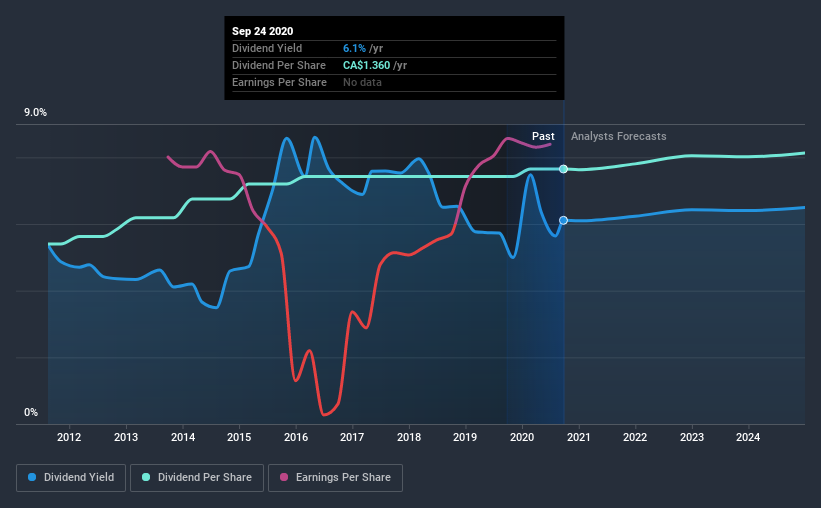Is It Worth Considering Gibson Energy Inc. (TSE:GEI) For Its Upcoming Dividend?

Some investors rely on dividends for growing their wealth, and if you're one of those dividend sleuths, you might be intrigued to know that Gibson Energy Inc. (TSE:GEI) is about to go ex-dividend in just 4 days. Ex-dividend means that investors that purchase the stock on or after the 29th of September will not receive this dividend, which will be paid on the 16th of October.
Gibson Energy's next dividend payment will be CA$0.34 per share, on the back of last year when the company paid a total of CA$1.36 to shareholders. Last year's total dividend payments show that Gibson Energy has a trailing yield of 6.1% on the current share price of CA$22.26. Dividends are an important source of income to many shareholders, but the health of the business is crucial to maintaining those dividends. So we need to investigate whether Gibson Energy can afford its dividend, and if the dividend could grow.
Check out our latest analysis for Gibson Energy
Dividends are typically paid from company earnings. If a company pays more in dividends than it earned in profit, then the dividend could be unsustainable. Gibson Energy paid out 112% of profit in the past year, which we think is typically not sustainable unless there are mitigating characteristics such as unusually strong cash flow or a large cash balance. That said, even highly profitable companies sometimes might not generate enough cash to pay the dividend, which is why we should always check if the dividend is covered by cash flow. Dividends consumed 58% of the company's free cash flow last year, which is within a normal range for most dividend-paying organisations.
It's disappointing to see that the dividend was not covered by profits, but cash is more important from a dividend sustainability perspective, and Gibson Energy fortunately did generate enough cash to fund its dividend. If executives were to continue paying more in dividends than the company reported in profits, we'd view this as a warning sign. Very few companies are able to sustainably pay dividends larger than their reported earnings.
Click here to see the company's payout ratio, plus analyst estimates of its future dividends.
Have Earnings And Dividends Been Growing?
Companies with consistently growing earnings per share generally make the best dividend stocks, as they usually find it easier to grow dividends per share. If earnings decline and the company is forced to cut its dividend, investors could watch the value of their investment go up in smoke. This is why it's a relief to see Gibson Energy earnings per share are up 10.0% per annum over the last five years.
The main way most investors will assess a company's dividend prospects is by checking the historical rate of dividend growth. In the past nine years, Gibson Energy has increased its dividend at approximately 3.9% a year on average. We're glad to see dividends rising alongside earnings over a number of years, which may be a sign the company intends to share the growth with shareholders.
Final Takeaway
Is Gibson Energy an attractive dividend stock, or better left on the shelf? Earnings per share have not grown all that much, and the company is paying out an uncomfortably high percentage of its income. Fortunately it paid out a lower percentage of its cash flow. It's not the most attractive proposition from a dividend perspective, and we'd probably give this one a miss for now.
With that in mind though, if the poor dividend characteristics of Gibson Energy don't faze you, it's worth being mindful of the risks involved with this business. Be aware that Gibson Energy is showing 2 warning signs in our investment analysis, and 1 of those is a bit concerning...
We wouldn't recommend just buying the first dividend stock you see, though. Here's a list of interesting dividend stocks with a greater than 2% yield and an upcoming dividend.
This article by Simply Wall St is general in nature. It does not constitute a recommendation to buy or sell any stock, and does not take account of your objectives, or your financial situation. We aim to bring you long-term focused analysis driven by fundamental data. Note that our analysis may not factor in the latest price-sensitive company announcements or qualitative material. Simply Wall St has no position in any stocks mentioned.
Have feedback on this article? Concerned about the content? Get in touch with us directly. Alternatively, email editorial-team@simplywallst.com.


